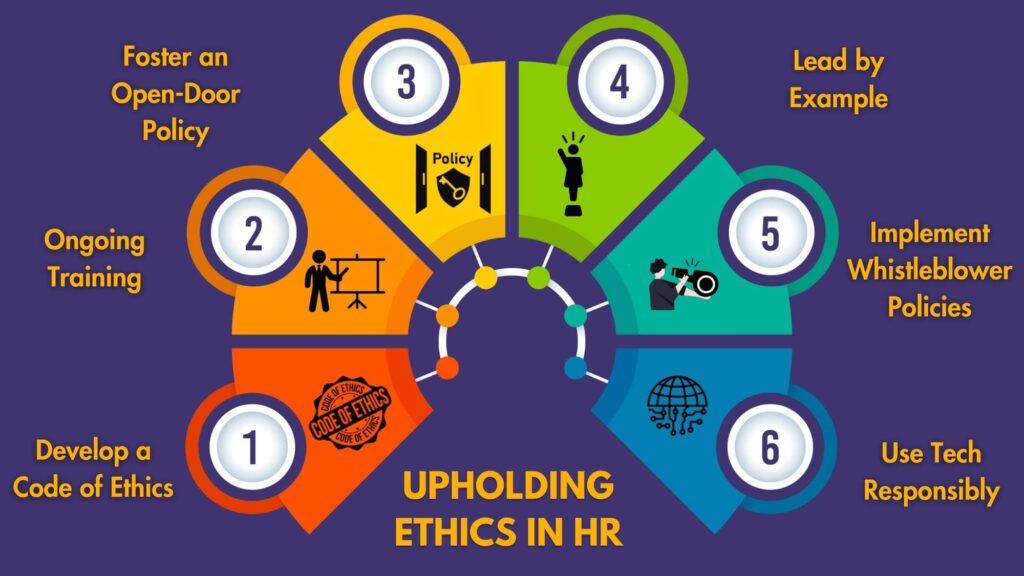Given the people-oriented nature of HR roles, a person’s ethics can have a huge impact on their career as well as their company. Ethics form the foundation of any successful organization, and for human resources (HR) professionals, maintaining high ethical standards is crucial.
After all, HR acts as the backbone of a company, bridging the gap between management and employees, shaping workplace culture, and ensuring compliance with labor laws. As such, their ethical values set the standard for the company’s culture and employees.
With India’s diverse workforce, intricate labor regulations, and evolving workplace expectations, HR ethics play an especially critical role. This article delves into the significance of ethics in an HR career and the challenges HR professionals face in maintaining ethical standards.
What Are Ethics in HR?
Ethics in HR encompass principles and values that guide HR professionals in their decision-making and actions. These include:
- Fairness and Equality: Ensuring all employees are treated equitably, irrespective of gender, caste, religion, or other biases.
- Confidentiality: Safeguarding sensitive employee information.
- Transparency: Maintaining openness in communication and decision-making.
- Integrity: Upholding honesty and trustworthiness in all dealings.
- Accountability: Taking responsibility for one’s actions and decisions.
In India, where social, cultural, and economic factors heavily influence workplace dynamics, ethical HR practices are desirable and essential to creating harmonious and productive workplaces.
Why Ethics Are Crucial in an HR Career
Building Trust and Credibility
HR professionals are often employees’ first point of contact, whether during onboarding, conflict resolution, or career growth discussions. Ethical conduct helps establish trust between HR and employees. For example, ensuring fair treatment for all employees in India’s culturally diverse workplaces can prevent mistrust and resentment.
Maintaining Confidentiality
HR professionals deal with sensitive information, such as employee salaries, performance evaluations, medical records, and grievances. Ethical practices ensure that such information is handled responsibly, maintaining confidentiality and respecting employees’ privacy. Breaching confidentiality can damage an organization’s reputation and lead to legal consequences, particularly under laws like the Indian IT Act (2000).
Promoting Inclusivity and Diversity
India’s workforce is becoming increasingly diverse, encompassing individuals from different regions, religions, genders, and socio-economic backgrounds. Ethical HR practices eliminate biases—conscious or unconscious—, promoting inclusivity and diversity. For instance, implementing unbiased hiring processes or addressing workplace harassment ethically fosters a positive work environment.
Ensuring Compliance with Labor Laws
India has a complex framework of labor laws, including the Payment of Wages Act (1936), the Equal Remuneration Act (1976), and the Maternity Benefit Act (1961). Ethical HR professionals ensure these laws are followed, protecting employee rights and preventing legal disputes. Non-compliance violates ethics and exposes companies to penalties and damage to their reputation.
Strengthening Organizational Culture
Ethics in HR set the tone for the overall organizational culture. When HR professionals model ethical behavior, it trickles down to all levels of the organization. In India, where hierarchical workplace structures often dominate, ethical HR practices encourage accountability and mutual respect among employees and leaders.
Conflict Resolution
Workplace conflicts are inevitable, but how they are handled can make a significant difference. Ethical HR professionals approach conflicts impartially, ensuring fair treatment for all parties involved. For example, if an employee files a complaint against a manager, the HR team must investigate the matter objectively, ensuring that neither favoritism nor prejudice influences the outcome.
Ethical Challenges Faced by HR Professionals in India
Despite their best efforts, HR professionals in India often face ethical dilemmas and challenges. Each day poses a new challenge that can require a re-evaluation of morals and all one stands for. Hence, it is important to keep one’s core values in mind.
Balancing Management and Employee Interests
HR professionals must strike a delicate balance between representing employee concerns and aligning with management goals. During layoffs, for example, they may face pressure to prioritize cost-cutting over employee welfare, leading to ethical conflicts.
Dealing with Bias
India’s workplaces, though evolving, still grapple with inherent biases related to gender, caste, and socio-economic status. HR professionals must actively combat such biases in hiring, promotions, and workplace interactions, which can be challenging in culturally ingrained settings.
Pressure to Manipulate Data
In some cases, HR professionals may be pressured to manipulate data, such as falsifying attrition reports or inflating performance appraisals. Succumbing to such pressures violates ethical standards and jeopardizes long-term organizational integrity.
Handling Harassment Cases
Addressing workplace harassment requires HR professionals to tread carefully, ensuring impartial investigations while respecting the confidentiality and dignity of all parties involved. In India, the Sexual Harassment of Women at Workplace (Prevention, Prohibition, and Redressal) Act, 2013, mandates that HR address such cases ethically and within legal frameworks.
How HR Professionals Can Uphold Ethics in Their Career
With the ups and downs that HR professionals face every day in their jobs, the task of maintaining ethics can be challenging. With planned out steps and open communication, one can not only maintain their own ethics but can also encourage others to be true to their values.

Develop a Code of Ethics
Organizations should establish a clear code of ethics for their HR teams, outlining expectations for fairness, transparency, and accountability. HR professionals must ensure these guidelines are communicated and adhered to across the organization.
Continuous Training and Awareness
Regular training on ethical practices can equip HR professionals with the tools needed to navigate complex workplace situations. In India, where labor laws frequently evolve, staying updated on legal and ethical standards is crucial.
Foster an Open-Door Policy
Encouraging employees to voice concerns without fear of retaliation promotes transparency and trust. HR professionals should actively listen to employee feedback and address issues promptly and ethically.
Lead by Example
HR professionals must embody the ethical values they advocate. Demonstrating fairness, integrity, and empathy in everyday actions sets a powerful example for employees and leaders.
Implement Whistleblower Policies
Organizations should have mechanisms that allow employees to report unethical behavior anonymously. HR professionals play a key role in implementing and managing such policies, ensuring that concerns are addressed without fear of retribution.
Adopt Technology Responsibly
With the rise of HR tech in India, from applicant tracking systems to employee monitoring tools, ethical use of technology is paramount. HR professionals must ensure that these tools enhance productivity and fairness, not invade privacy or perpetuate bias.
The Benefits of Ethics in HR
Enhanced Employee Morale
Employees who see HR as ethical and fair feel valued and respected, leading to higher job satisfaction and morale.
Improved Employer Branding
Ethical practices strengthen an organization’s reputation, making it an employer of choice. This is especially important in India’s competitive job market, where attracting and retaining top talent is a priority.
Reduced Legal Risks
Adhering to ethical and legal standards minimizes the risk of lawsuits and regulatory penalties, ensuring smoother business operations.
Stronger Employee-Employer Relationships
Ethics build trust between employees and employers, fostering long-term loyalty and commitment.
Conclusion
Ethics are not optional in an HR career; they are the cornerstone of effective and meaningful human resource management. For HR professionals in India, navigating the diverse and complex workplace environment requires a steadfast commitment to ethical principles.
HR can play a transformative role in shaping inclusive and thriving organizations by upholding fairness, transparency, and accountability. In a country as diverse as India, ethical HR practices are more than just a professional obligation—they contribute to workplaces that respect individual dignity, promote equality, and ensure justice.
For HR professionals, being ethical is not just about doing the right thing; it’s about creating a legacy of trust and integrity that inspires employees and leaders.




